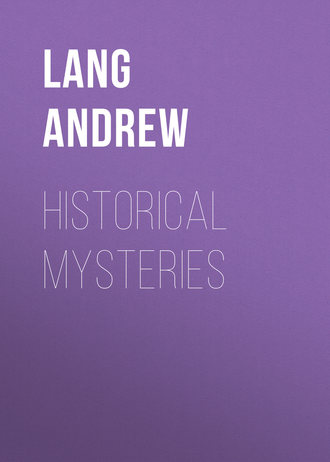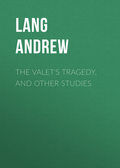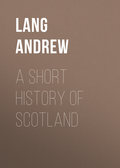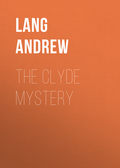
Lang Andrew
Historical Mysteries
Loomworth Dane swore to Mary Squires, whom he had observed so closely as to note a great hole in the heel of her stocking. The date was Old Christmas Day, 1752. Dane was landlord of the Bell, at Enfield, and a maker of horse-collars. Sarah Star, whose house was next to Mrs. Wells's, saw Mary Squires in her own house on January 18 or 19; Mary wanted to buy pork, and hung about for three-quarters of an hour, offering to tell fortunes. Mrs. Star got rid of her by a present of some pig's flesh. She fixed the date by a document which she had given to Miles, a solicitor; it was not in court. James Pratt swore to talk with Mary Squires before Christmas as to her lost pony; she had then a man with her. He was asked to look round the court to see if the man was present, whereon George Squires ducked his head, and was rebuked by the prosecuting counsel, Mr. Davy, who said 'It does not look well.' It was hardly the demeanour of conscious innocence. But Pratt would not swear to him. Mary Squires told Pratt that she would consult 'a cunning-man about the lost pony,' and Mr. Nares foolishly asked why a cunning woman should consult a cunning man? 'One black fellow will often tell you that he can and does something magical, whilst all the time he is perfectly aware that he cannot, and yet firmly believes that some other man can really do it.' So write Messrs. Spencer and Gillen in their excellent book on The Native Tribes of Central Australia (p. 130); and so it was with the gipsy, who, though a 'wise woman,' believed in a 'wise man.'
This witness (Pratt) said, with great emphasis: 'Upon my oath, that is the woman… I am positive in my conscience, and I am sure that it was no other woman; this is the woman I saw at that blessed time.' Moreover, she gave him her name as the name on the clog of the lost pony. The affair of the pony was just what would impress a man like Pratt, and, on the gipsies' own version, they had no pony with them in their march from Dorset.
All this occurred before Pratt left his house, which was on December 22, 'three days before New Christmas.' He then left Enfield for Cheshunt, and his evidence carries conviction.
In some other cases witnesses were very stupid – could not tell in what month Christmas fell. One witness, an old woman, made an error, confusing January 16 with January 23. A document on which she relied gave the later date.
If witnesses on either side were a year out in their reckoning, the discrepancies would be accountable; but Pratt, for example, could not forget when he left Enfield for Cheshunt, and Farmer Smith and Mrs. Howard could be under no such confusion of memory. It may be prejudice, but I rather prefer the Enfield evidence in some ways, as did Mr. Paget. In others, the Dorset evidence seems better.
Elizabeth had sworn to having asked a man to point out the way to London after she escaped into the lane beside Mrs. Wells's house. A man, Thomas Bennet, swore that on January 29, 1753, he met 'a miserable, poor wretch, about half-past four,' 'near the ten-mile stone,' in a lane. She asked her way to London; 'she said she was affrighted by the tanner's dog.' The tanner's house was about two hundred yards nearer London, and the prosecution made much of this, as if a dog, with plenty of leisure and a feud against tramps, could not move two hundred yards, or much more, if he were taking a walk abroad, to combat the object of his dislike. Bennet knew that the dog was the tanner's; probably he saw the dog when he met the wayfarer, and it does not follow that the wayfarer herself called it 'the tanner's dog.' Bennet fixed the date with precision. Four days later, hearing of the trouble at Mrs. Wells's, Bennet said, 'I will be hanged if I did not meet the young woman near this place and told her the way to London.' Mr. Davy could only combat Bennet by laying stress on the wayfarer's talking of 'the tanner's dog.' But the dog, at the moment of the meeting, was probably well in view. Bennet knew him, and Bennet was not asked, 'Did the woman call the dog "the tanner's dog," or do you say this of your own knowledge?' Moreover, the tannery was well in view, and the hound may have conspicuously started from that base of operations. Mr. Davy's reply was a quibble.
His closing speech merely took up the old line: Elizabeth was absent to conceal 'a misfortune'; her cunning mother was her accomplice. There was no proof of Elizabeth's unchastity; nay, she had an excellent character, 'but there is a time, gentlemen, when people begin to be wicked.' If engaged for the other side Mr. Davy would have placed his 'Nemo repente fuit turpissimus' – no person of unblemished character wades straight into 'innocent blood,' to use his own phrase.
The Recorder summed up against Elizabeth. He steadily assumed that Nash was always right, and the neighbours always wrong, as to the girl's original story. He said nothing of Bennet; the tanner's dog had done for Bennet. He said that, if the Enfield witnesses were right, the Dorset witnesses were wilfully perjured. He did not add that, if the Dorset witnesses were right, the Enfield testifiers were perjured.
The jury brought in a verdict of 'Guilty of perjury, but not wilful and corrupt.' This was an acquittal, but, the Recorder refusing the verdict, they did what they were desired to do, and sentence was passed. Two jurors made affidavit that they never intended a conviction. The whole point had turned, in the minds of the jury, on a discrepancy as to when Elizabeth finished the water in the broken pitcher – on Wednesday, January 27, or on Friday, January 29. Both accounts could not be true. Here, then, was 'perjury,' thought the jury, but not 'wilful and corrupt,' not purposeful. But the jury had learned that 'the court was impatient;' they had already brought Elizabeth in guilty of perjury, by which they meant guilty of a casual discrepancy not unnatural in a person hovering between life and death. They thought that they could not go back on their 'Guilty,' and so they went all the way to 'corrupt and wilful perjury' – murder by false oath – and consistently added 'an earnest recommendation to mercy'!
By a majority of one out of seventeen judges, Elizabeth was banished for seven years to New England. She was accused in the Press of being an 'enthusiast,' but the Rev. William Reyner, who attended her in prison, publicly proclaimed her a good Churchwoman and a good girl (June 7, 1754). Elizabeth (June 24) stuck to her guns in a manifesto – she had not once 'knowingly deviated from the truth.'
Mr. Davy had promised the jury that when Elizabeth was once condemned all would come out – the whole secret. But though the most careful attempts were made to discover her whereabouts from January 1 to January 29, 1753, nothing was ever found out – a fact most easily explained by the hypothesis that she was where she said she was, at Mother Wells's.
As to Elizabeth's later fortunes, accounts differ, but she quite certainly married, in Connecticut, a Mr. Treat, a respectable yeoman, said to have been opulent. She died in Connecticut in June 1773, leaving a family.
In my opinion Elizabeth Canning was a victim of the common sense of the eighteenth century. She told a very strange tale, and common-sense holds that what is strange cannot be true. Yet something strange had undeniably occurred. It was very strange if Elizabeth on the night of January 1, retired to become a mother, of which there was no appearance, while of an amour even gossip could not furnish a hint. It was very strange if, having thus retired, she was robbed, starved, stripped and brought to death's door, bleeding and broken down. It was very strange that no vestige of evidence as to her real place of concealment could ever be discovered. It was amazingly strange that a girl, previously and afterwards of golden character, should in a moment aim by perjury at 'innocent blood.' But the eighteenth century, as represented by Mr. Davy, Mr. Willes, the barrister who fabled in court, and the Recorder, found none of these things one half so strange as Elizabeth Canning's story. Mr. Henry Fielding, who had some knowledge of human nature, was of the same opinion as the present candid inquirer. 'In this case,' writes the author of Tom Jones, 'one of the most simple girls I ever saw, if she be a wicked one, hath been too hard for me. I am firmly persuaded that Elizabeth Canning is a poor, honest, simple, innocent girl.'
Moi aussi, but – I would not have condemned the gipsy!
In this case the most perplexing thing of all is to be found in the conflicting unpublished affidavits sworn in March 1753, when memories as to the whereabouts of the gipsies were fresh. They form a great mass of papers in State Papers Domestic, at the Record Office. I owe to Mr. Courtney Kenny my knowledge of the two unpublished letters of Fielding to the Duke of Newcastle which follow:
'My Lord Duke, – I received an order from my Lord Chancellor immediately after the breaking up of the Council to lay before your Grace all the Affidavits I had taken since the Gipsy Trial which related to that Affair. I then told the Messenger that I had taken none, as indeed the fact is the Affidavits of which I gave my Lord Chancellor an Abstract having been all sworn before Justices of the Peace in the Neighbourhood of Endfield, and remain I believe in the Possession of an Attorney in the City.
'However in Consequence of the Commands with which your Grace was pleased to honour me yesterday, I sent my Clerk immediately to the Attorney to acquaint him with the Commands, which I doubt not he will instantly obey. This I did from my great Duty to your Grace, for I have long had no Concern in this Affair, nor have I seen any of the Parties lately unless once when I was desired to send for the Girl (Canning) to my House that a great number of Noblemen and Gentlemen might see her and ask her what Questions they pleased. I am, with the highest Duty,
'My Lord,'Your Grace's most obedientand most humble Servant,'Henry Fielding.
'Ealing; April 14, 1753.
'His Grace the Duke of Newcastle.'
'Endorsed: Ealing, April 14th, 1753
Mr. Fielding.
R. 16th.'
'My Lord Duke, – I am extremely concerned to see by a Letter which I have just received from Mr. Jones by Command of your Grace that the Persons concerned for the Prosecution have not yet attended your Grace with the Affidavits in Canning's Affair. I do assure you upon my Honour that I sent to them the moment I first received your Grace's Commands, and having after three Messages prevailed with them to come to me I desired them to fetch the Affidavits that I might send them to your Grace, being not able to wait on you in Person. This they said they could not do, but would go to Mr. Hume Campbell their Council, and prevail with him to attend your Grace with all their Affidavits, many of which I found were sworn after the Day mentioned in the Order of Council. I told them I apprehended the latter could not be admitted but insisted in the strongest Terms on their laying the others immediately before your Grace, and they at last promised me they would, nor have I ever seen them since.
'I have now again ordered my Clerk to go to them to inform them of the last Commands I have received, but as I have no Compulsory Power over them I cannot answer for their Behaviour, which indeed I have long disliked, and have therefore long ago declined giving them any advice, nor would I unless in Obedience to your Grace have anything to say to a set of the most obstinate fools I ever saw, and who seem to me rather to act from a Spleen against my Lord Mayor, than from any motive of Protecting Innocence, tho' that was certainly their motive at first.3 In Truth, if I am not deceived, I suspect that they desire that the Gipsey should be pardoned, and then to convince the World that she was guilty in order to cast the greater Reflection on him who was principally instrumental in obtaining such Pardon. I conclude with assuring your Grace that I have acted in this Affair, as I shall on all Occasions, with the most dutiful Regard to your Commands, and that if my Life had been at Stake, as many know, I could have done no more. I am, with the highest Respect,
'My Lord Duke,'Yr. Grace's most obedientand most humble Servant,'Henry Fielding.
'Ealing; April 27, 1753.
'His Grace the Duke of Newcastle.'
Endorsed: 'Ealing: April 27th, 1753.
Mr. Fielding.'
II
THE MURDER OF ESCOVEDO
'Many a man,' says De Quincey, 'can trace his ruin to a murder, of which, perhaps, he thought little enough at the time.' This remark applies with peculiar force to Philip II. of Spain, to his secretary, Antonio Perez, to the steward of Perez, to his page, and to a number of professional ruffians. All of these, from the King to his own scullion, were concerned in the slaying of Juan de Escovedo, secretary of Philip's famous natural brother, Don John of Austria. All of them, in different degrees, had bitter reason to regret a deed which, at the moment, seemed a commonplace political incident.
The puzzle in the case of Escovedo does not concern the manner of his taking off, or the identity of his murderers. These things are perfectly well known; the names of the guilty, from the King to the bravo, are ascertained. The mystery clouds the motives for the deed. Why was Escovedo done to death? Did the King have him assassinated for purely political reasons, really inadequate, but magnified by the suspicious royal fancy? Or were the secretary of Philip II. and the monarch of Spain rivals in the affections of a one-eyed widow of rank? and did the secretary, Perez, induce Philip to give orders for Escovedo's death, because Escovedo threatened to reveal to the King their guilty intrigue? Sir William Stirling-Maxwell and Monsieur Mignet accepted, with shades of difference, this explanation. Mr. Froude, on the other hand, held that Philip acted for political reasons, and with the full approval of his very ill-informed conscience. There was no lady as a motive in the case, in Mr. Froude's opinion. A third solution is possible: Philip, perhaps, wished to murder Escovedo for political reasons, and without reference to the tender passion; but Philip was slow and irresolute, while Perez, who dreaded Escovedo's interference with his love affair, urged his royal master on to the crime which he was shirking. We may never know the exact truth, but at least we can study a state of morals and manners at Madrid, compared with which the blundering tragedies of Holyrood, in Queen Mary's time, seem mere child's play. The 'lambs' of Bothwell are lambs playful and gentle when set beside the instruments of Philip II.
The murdered man, Escovedo, and the 'first murderer,' as Shakespeare says, Antonio Perez, had both been trained in the service of Ruy Gomez, Philip's famous minister. Gomez had a wife, Aña de Mendoza, who, being born in 1546, was aged thirty-two, not thirty-eight (as M. Mignet says), in 1578, when Escovedo was killed. But 1546 may be a misprint for 1540. She was blind in one eye in 1578, but probably both her eyes were brilliant in 1567, when she really seems to have been Philip's mistress, or was generally believed so to be. Eleven years later, at the date of the murder, there is no obvious reason to suppose that Philip was constant to her charms. Her husband, created Prince d'Eboli, had died in 1573 (or as Mr. Froude says in 1567); the Princess was now a widow, and really, if she chose to distinguish her husband's old secretary, at this date the King's secretary, Antonio Perez, there seems no reason to suppose that Philip would have troubled himself about the matter. That he still loved Aña with a constancy far from royal, that she loved Perez, that Perez and she feared that Escovedo would denounce them to the King, is M. Mignet's theory of the efficient cause of Escovedo's murder. Yet M. Mignet holds, and rightly, that Philip had made up his mind, as far as he ever did make up his mind, to kill Escovedo, long before that diplomatist became an inconvenient spy on the supposed lovers.
To raise matters to the tragic height of the Phædra of Euripides, Perez was said to be the natural son of his late employer, Gomez, the husband of his alleged mistress. Probably Perez was nothing of the sort; he was the bastard of a man of his own name, and his alleged mistress, the widow of Gomez, may even have circulated the other story to prove that her relations with Perez, though intimate, were innocent. They are a pretty set of people!
As for Escovedo, he and Perez had been friends from their youth upwards. While Perez passed from the service of Gomez to that of Philip, in 1572 Escovedo was appointed secretary to the nobly adventurous Don John of Austria. The Court believed that he was intended to play the part of spy on Don John, but he fell under the charm of that gallant heart, and readily accepted, if he did not inspire, the most daring projects of the victor of Lepanto, the Sword of Christendom. This was very inconvenient for the leaden-footed Philip, who never took time by the forelock, but always brooded over schemes and let opportunity pass. Don John, on the other hand, was all for forcing the game, and, when he was sent to temporise and conciliate in the Low Countries, and withdraw the Spanish army of occupation, his idea was to send the Spanish forces out of the Netherlands by sea. When once they were on blue water he would make a descent on England; rescue the captive Mary Stuart; marry her (he was incapable of fear!); restore the Catholic religion, and wear the English crown. A good plot, approved of by the Pope, but a plot which did not suit the genius of Philip. He placed his leaden foot upon the scheme and on various other gallant projects, conceived in the best manner of Alexandre Dumas. Now Escovedo, to whom Don John was devotedly attached, was the soul of all these chivalrous designs, and for that reason Philip regarded him as a highly dangerous person. Escovedo was at Madrid when Don John first went to the Low Countries (1576). He kept urging Philip to accept Don John's fiery proposals, though Antonio Perez entreated him to be cautious. At this date, 1576, Perez was really the friend of Escovedo. But Escovedo would not be advised; he wrote an impatient memorial to the King, denouncing his stitchless policy (descosido), his dilatory, shambling, idealess proceedings. So, at least, Sir William Stirling-Maxwell asserts in his Don John of Austria: 'the word used by Escovedo was descosido, "unstitched."' But Mr. Froude says that Philip used the expression, later, in reference to another letter of Escovedo's which he also called 'a bloody letter' (January 1578). Here Mr. Froude can hardly be right, for Philip's letter containing that vulgar expression is of July 1577.
In any case, in 1576 Philip was induced, by the intercession of Perez, to overlook the fault, and Escovedo, whose presence Don John demanded, was actually sent to him in December 1576. From this date both Don John and Escovedo wrote familiarly to their friend Perez, while Perez lured them on, and showed their letters to the King. Just as Charles I. commissioned the Duke of Hamilton to spy on the Covenanted nobles, and pretend to sympathise with them, and talk in their godly style, so Philip gave Perez orders to entrap Don John and Escovedo. Perez said: 'I want no theology but my own to justify me,' and Philip wrote in reply, 'My theology takes the same view of the matter as your own.'
At this time, 1577, Perez, though a gambler and a profligate, who took presents from all hands, must have meant nothing worse, on M. Mignet's theory, than to serve Philip as he loved to be served, and keep him well informed of Don John's designs. Escovedo was not yet, according to M. Mignet, an obstacle to the amours of Perez and the King's mistress, the Princess d'Eboli. Sir William Stirling-Maxwell, on the other hand, holds that the object of Perez already was to ruin Don John; for what reason Sir William owns that he cannot discover. Indeed Perez had no such object, unless Don John confided to him projects treasonous or dangerous to the Government of his own master, the King.
Now did Don John, or Escovedo, entrust Perez with designs not merely chivalrous and impracticable, but actually traitorous? Certainly Don John did nothing of the kind. Escovedo left him and went, without being called for, to Spain, arriving in July 1577. During his absence Don John defeated the Dutch Protestants in the battle of Gemblours, on January 31, 1578. He then wrote a letter full of chivalrous loyalty to Escovedo and Perez at Madrid. He would make Philip master indeed of the Low Countries; he asked Escovedo and Perez to inspire the King with resolution. To do that was impossible, but Philip could never have desired to murder Escovedo merely because he asked help for Don John. Yet, no sooner did Escovedo announce his return to Spain, in July 1577, than Philip, in a letter to Perez, said, 'we must hasten to despatch him before he kills us.' There seems to be no doubt that the letter in which this phrase occurs is authentic, though we have it only in a copy. But is the phrase correctly translated? The words 'priesa á despacherle antes que nos mate' certainly may be rendered, 'we must be quick and despatch him' (Escovedo) 'before he kills us.' But Mr. Froude, much more lenient to Philip than to Mary Stuart, proposes to render the phrase, 'we must despatch Escovedo quickly' (i. e. send him about his business) 'before he worries us to death.' Mr. Froude thus denies that, in 1577, Philip already meant to kill Escovedo. It is unlucky for Mr. Froude's theory, and for Philip's character, if the King used the phrase twice. In March 1578 he wrote to Perez, about Escovedo, 'act quickly antes que nos mate, – before he kills us.' So Perez averred, at least, but is his date correct? This time Perez did act, and Escovedo was butchered! If Perez tells truth, in 1577, Philip meant what he said, 'Despatch him before he kills us.'
Why did Philip thus dread Escovedo? We have merely the published statements of Perez, in his account of the affair. After giving the general causes of Philip's distrust of Don John, and the ideas which a deeply suspicious monarch may very well have entertained, considering the adventurous character of his brother, Perez adds a special charge against Escovedo. He vowed, says Perez, that, after conquering England, he and Don John would attack Spain. Escovedo asked for the captaincy of a castle on a rock commanding the harbour of Santander; he was alcalde of that town. He and Don John would use this fortress, as Aramis and Fouquet, in the novel of Dumas, meant to use Belle Isle, against their sovereign. As a matter of fact, Escovedo had asked for the command of Mogro, the fortress commanding Santander, in the spring of 1577, and Perez told Philip that the place should be strengthened, for the protection of the harbour, but not entrusted to Escovedo. Don John's loyalty could never have contemplated the use of the place as a keep to be held in an attack on his King. But, if Perez had, in 1577, no grudge against Escovedo as being perilous to his alleged amour with the Princess d'Eboli, then the murderous plan of Philip must have sprung from the intense suspiciousness of his own nature, not from the promptings of Perez.
Escovedo reached Spain in July 1577. He was not killed till March 31, 1578, though attempts on his life were made some weeks earlier. M. Mignet argues that, till the early spring of 1578, Philip held his hand because Perez lulled his fears; that Escovedo then began to threaten to disclose the love affair of Perez to his royal rival, and that Perez, in his own private interest, now changed his tune, and, in place of mollifying Philip, urged him to the crime. But Philip was so dilatory that he could not even commit a murder with decent promptitude. Escovedo was not dangerous, even to his mind, while he was apart from Don John. But as weeks passed, Don John kept insisting, by letter, on the return of Escovedo, and for that reason, possibly, Philip screwed his courage to the (literally) 'sticking' point, and Escovedo was 'stuck.' Major Martin Hume, however, argues that, by this time, circumstances had changed, and Philip had now no motive for murder.
The impression of M. Mignet, and of Sir William Stirling-Maxwell, the biographer of Don John, is quite different. They hold that the Princess d'Eboli, in 1578, was Philip's mistress; that she deceived him with Perez; that Escovedo threatened to tell all, and that Perez therefore hurried on his murder. Had this been the state of affairs, would Escovedo have constantly accepted the invitations of Perez to dinner? The men would necessarily have been on the worst of terms, if Escovedo was threatening Perez, but Escovedo, in fact, kept on dining with Perez. Again, the policy of Perez would have been to send Escovedo where he wanted to go, to Flanders, well out of the way, back to Don John. It seems probable enough, though not certain, that, in 1567, the Princess and Philip were lovers. But it is, most unlikely, and it is not proved, that Philip was still devoted to the lady in 1578. Some of the Princess's family, the Mendozas, now wanted to kill Perez, as a dishonour to their blood. At the trial of Perez later, much evidence was given to show that he loved the Princess, or was suspected of doing so, but it is not shown that this was a matter about which Philip had any reason to concern himself. Thus it is not inconceivable that Escovedo disliked the relations between Perez and the Princess, but nothing tends to show that he could have made himself dangerous by revealing them to the King. Moreover, if he spoke his mind to Perez on the matter, the two would not have remained, as apparently they did, on terms of the most friendly intercourse. A squire of Perez described a scene in which Escovedo threatened to denounce the Princess, but how did the squire become a witness of the scene, in which the Princess defied Escovedo in terms of singular coarseness?
At all events, when Philip consulted the Marquis of Los Velez on the propriety of killing Escovedo rather than sending him back to Don John, the reasons, which convinced the Marquis, were mere political suspicions.
It was at that time a question of conscience whether a king might have a subject assassinated, if the royal motives, though sufficient, were not such as could be revealed with safety in a court of justice. On these principles Queen Mary had a right to take Darnley off, for excellent political causes which could not safely be made public; for international reasons. Mary, however, unlike Philip, did not consult her confessor, who believed her to be innocent of her husband's death. The confessor of Philip told him that the King had a perfect right to despatch Escovedo, and Philip gave his orders to Perez. He repeated, says Perez, in 1578, his words used in 1577: 'Make haste before he kills us.'
As to this point of conscience, the right of a king to commit murder on a subject for reasons of State, Protestant opinion seems to have been lenient. When the Ruthvens were killed at Perth, on August 5, 1600, in an affair the most mysterious of all mysteries, the Rev. Robert Bruce, a stern Presbyterian, refused to believe that James VI. had not planned their slaughter. 'But your Majesty might have secret reasons,' said Bruce to the King, who, naturally and truly, maintained his own innocence. This looks as if Mr. Bruce, like the confessor of Philip, held that a king had a right to murder a subject for secret reasons of State. The Inquisition vigorously repudiated the doctrine, when maintained by a Spanish preacher, but Knox approved of King Henry's (Darnley's) murder of Riccio. My sympathies, on this point, are with the Inquisition.
Perez, having been commissioned to organise the crime, handed on the job to Martinez, his steward. Martinez asked a ruffianly page, Enriquez, 'if I knew anybody in my country' (Murcia) 'who would stick a knife into a person.' Enriquez said, 'I will speak about it to a muleteer of my acquaintance, as, in fact, I did, and the muleteer undertook the business.' But later, hearing that a man of importance was to be knifed, Enriquez told Perez that a muleteer was not noble enough: the job 'must be entrusted to persons of more consideration.'
Enriquez, in 1585, confessed for a good reason; Perez had absurdly mismanaged the business. All sorts of people were employed, and, after the murder, they fled, and began to die punctually in an alarming manner. Naturally Enriquez thought that Perez was acting like the Mures of Auchendrane, who despatched a series of witnesses and accomplices in their murder of Kennedy. As they always needed a new accomplice to kill the previous accomplice, then another to slay the slayer, and so on, the Mures if unchecked would have depopulated Scotland. Enriquez surmised that his turn to die would soon come; so he confessed, and was corroborated by Diego Martinez. Thus the facts came out, and this ought to be a lesson to murderers.
As the muleteer hung fire, Perez determined to poison Escovedo. But he did not in the least know how to set about it. Science was hardly in her infancy. If you wanted to poison a man in Scotland, you had to rely on a vulgar witch, or send a man to France, at great expense, to buy the stuff, and the messenger was detected and tortured. The Court of Spain was not more scientific.
Martinez sent Enriquez to Murcia, to gather certain poisonous herbs, and these were distilled by a venal apothecary. The poison was then tried on a barndoor fowl, which was not one penny the worse. But Martinez somehow procured 'a certain water that was good to be given as a drink.' Perez asked Escovedo to dinner, Enriquez waited at table, and in each cup of wine that Escovedo drank, he, rather homœopathically, put 'a nutshellful of the water.' Escovedo was no more poisoned than the cock of the earlier experiment. 'It was ascertained that the beverage produced no effect whatever.'







